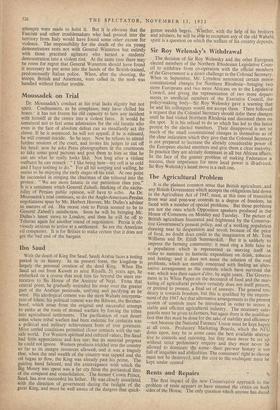Ibn Saud
With the death of King Ibn Saud, Saudi Arabia faces a testing period in its history. In its present form, the kingdom is largely the personal creation of the dead King. When Ibn Saud set out from Kuweit to seize Riyadh, 51 years ago, he embarked on a course that took him far beyond the mere res- toration to His House of the Amirate of Nejd. From that central point, he gradually extended his sway over the greater part of the Arabian peninsula, unifying and pacifying as he went. His ideological cement was the stern Wahabi interpreta- tion of Islam; his political cement was the Ikhwan, the Brother- hood, which arose from the original and successful attempt to strike at the roots of ittimad warfare by forcing the tribes into agricultural settlements. The pacification of vast desert areas where tribal warfare had been endemic for centuries was a political and military achievement born of true greatness. More settled conditions permitted closer contacts with thc out- side world. For Western spiritual and cultural values, Ibn Saud had little appreciation and•less use; but its material progress he could not ignore. Western products trickled into the country so far as its meagre resources allowed, and it was a tragedy that, when the real wealth of the country was tapped and the oil began to flow, the King was already past his prime. The guiding hand faltered, and the extravagance with which the Big Money was spent was a far cry from the puritanical fires of the conquest and consolidation. The former Crown Prince, Saud, has now succeeded his father. He was closely associated with the direction of government during the twilight of the great King, and must be well aware of the dangers that quick- gotten wealth begets. Whether, with the help of his brothers and advisers, he will be able to recapture any of the old Wahabi spirit is a question on which the welfare of his country depends.
































 Previous page
Previous page